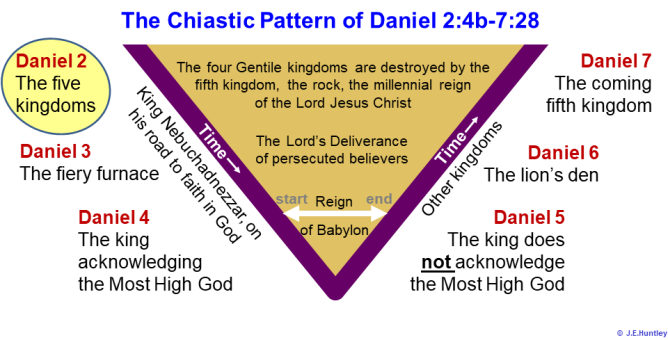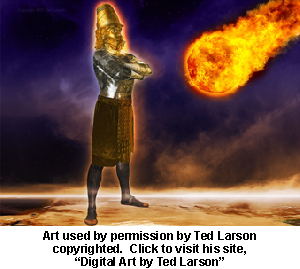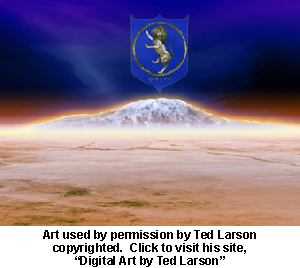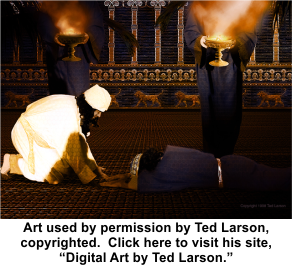Daniel: Chapter 2
Setting
In his book, Daniel, Walvoord pointed out the chiastic symmetry in the book of Daniel that is devoted to the Gentile kingdoms. It is where Daniel writes in the Aramaic language from the second half of Daniel 2:4 through Daniel 7:28. The order of the topical events from Daniel 2 through Daniel 4 are in reverse order from Daniel 5 through Daniel 7. Walvoord wrote that Daniel 2 and Daniel 7 are devoted to the ultimate demise of the Gentile nations and the ushering in of the Lord’s millennial kingdom after the tribulation, Daniel 2:43-45, Daniel 7:23-27. Daniel 3 and Daniel 6 show the horrific persecution of the Jews under the power of the Gentile nations, which will continue until the Lord returns, Revelation 19:11-16, Zechariah 14:3-5. The third and last of these comparisons is Daniel 4 and Daniel 5. These chapters show the beginning and the end of the Babylonian empire.
 The above graphic summarizes the proceeding discussion. The left side of the purple V, illustrates the progression of King Nebuchadnezzar’s journey to his belief in the Most High God, Daniel 4:1-3, the God Daniel worshiped, the God of Abraham, Isaac, and Jacob.
The above graphic summarizes the proceeding discussion. The left side of the purple V, illustrates the progression of King Nebuchadnezzar’s journey to his belief in the Most High God, Daniel 4:1-3, the God Daniel worshiped, the God of Abraham, Isaac, and Jacob.
The beginning of the empire's greatness was illustrated in King Nebuchadnezzar’s first dream, in which he was declared to be the head of gold, Daniel 2:37-38. The greatness of King Nebuchadnezzar’s kingdom was confirmed in his second dream, Daniel 4:20-22. The end of the Babylonian kingdom came when King Belshazzar ruled in Babylon, and he saw a hand writing on the wall during his drunken feast, while his enemy was at Babylon’s gate, laying siege against him, Daniel 5:1-4, 5. The writing on the wall was seen by all, but understood by none. Eventually, Daniel was summoned into the king’s presence to interpret the words. Despite hearing the words on the wall and God’s intention to remove him from power that very night, the king had no faith, and so disregarded God’s warning to him, Daniel 5:22-28, 30-31. In all these chapters, God shows that He is sovereign over all the affairs of all mankind; that His Word shall go forth, and it shall not return to Him void, but shall accomplish that which He intended and it will prosper where He sent it, Isaiah 55:11.
Just as God had prepared Moses to lead the nation of Israel out of Egypt, so He prepared Daniel, Hananiah, Mishael, and Azariah for their service while under the rule of King Nebuchadnezzar. The end of Daniel 1:1-21 described their proven God-given skill and understanding, Daniel 1:17-21. Since there is nothing about Daniel’s childhood, it is not known if he was able to interpret dreams as a boy like Joseph did. Nevertheless, both Joseph and Daniel recognized that their abilities came from the Lord, and gave all the glory to God for the revelation of the meaning for the dreams, Genesis 41:15-16, Daniel 2:26-28. Scripture goes on to show the manifestation of Daniel’s faith through his prayers to God throughout the book of Daniel.
Daniel 2:1-49 describes God’s plan in world events during the age of the Gentiles, as shown in the timeline for the Gentile era. King Nebuchadnezzar’s dream was given by the God of Israel to describe his future and the eventual passing of his kingdom to an inferior one. The purpose of these prophecies from the Lord were to reveal Himself to the king and to all the nations; to make him understand who the Lord is, and that He is the Lord over all creation and of all past, present, and future events.
There are several references to time and dates in the book of Daniel, beginning with this chapter. It is important to be cognizant of the method of dating that is being used and how it is applied in any part of scripture, whether it is Israel's civil or religious calendar, or the Babylonian calendar is being applied. When Daniel and his friends were first taken captive, they were given three years to learn the Babylonian customs, knowledge, and lifestyles before appearing before King Nebuchadnezzar and examined by him, Daniel 1:5. A seeming contradiction in Daniel regarding the time of King Nebuchadnezzar's dream, which is recorded as the second year, Daniel 2:1, is resolved by understanding the differences of the calendars used by the two people groups, Israelis and the Babylonians. The time of the king’s dream in Daniel 2:1-49, would have occurred three years after Daniel's exile, and following the examination of the four Hebrews by the king. The reason for the difference in the dates, is the dating practice of the Babylonians. They did not count the first year of a king's ascension to the throne. This accounts for the one-year difference between the first two chapters in the book of Daniel.
In Daniel 2:1-4, the king had a troubling dream. This was not an uncommon means for God to communicate with people and their leaders. He used dreams through history to communicate His will to Gentile leaders, and to those in the line of Abram, the line of promise. God used those from this line, such as Joseph, to interpret the dreams of Gentile leaders, Genesis 41:15. Other incidents in the Old Testament of dreams and sleeplessness were, God’s warning to Abimelech about Sarah, Genesis 20:3, 17, and of King Ahasuerus’s lost sleep, Esther 6:1-3, 10-11.
It is brought out in Daniel 2:29 that the purpose of King Nebuchadnezzar’s dream was to show the king “… what should come to pass hereafter …”. This chapter and the remaining chapters in Daniel are all about future events as they relate to the Gentiles and to Israel. Who knows what may have been on the mind of the king that night, but it does not matter. It was the Lord's time to reveal to mankind the changes that would take place over several millennia during the Gentile rule over the land of Israel and Jerusalem, and the signs of His first and second advents. It was also the time for the Lord to reveal the true nature of the gifts of discernment in dreams and visions that He had blessed Daniel with, Daniel 1:17. In the current situation as revealed in this section, as sometimes happens, the king had forgotten the details of the dream when he awoke, but not the emotional trauma he suffered as he experienced the dream. God had impressed on him an intense dream, and he sought out its meaning. In the discourse the king had with the magicians, astrologers, sorcerers, and the Chaldeans in his court, he asked two questions:
- The details of the dream that he had forgotten
- Its interpretation, Daniel 2:1-3
This was a very high matter for the king to resolve, so he called the most brilliant intellects in his realm to solve this problem. But why did the king exclude the four Hebrews who had just recently passed his examination? It is possible that the king, though impressed with the four Hebrews' intellectual skills being greater than others in his realm, chose not seek their council in the matter of his dream because of three factors; their age, and lack of experience, and lack of familiarity within the king's court, Daniel 1:20. Nevertheless, the Lord blessed Daniel and the other three Hebrews, and showed Daniel to be a true prophet, Numbers 12:6.
The king, who had to discern between those who would provide quality, truthful council versus those who were self-serving. Today, the church is faced with a similar threat and it has to guard against deceit and the perversion of God’s truth. Jesus warned us to be on the alert against false Christs, Matthew 24:4-5. John also warned each Christian to guard against false teachers, 1John 4:1-4. Paul, too, wrote of his concern that there would be those who would seek to pervert the simplicity of the gospel, 1Corinthians 15:1-4, 2Corinthians 11:1-4.
From the beginning of the book of Daniel to this point,the text was written in the Hebrew language. From here on, until the end of the seventh chapter of Daniel, the language used to write this book changes to the Syriack or Aramaic language, as shown in Daniel chapter 1 on this website. The inference for this change is the focus of the text toward the Gentiles. This part of Daniel moves from chronicling the end of Judah’s sovereignty and treatment of the Hebrew youths, to the future of select Gentile nations and the exercise of their power and rule over Judah, and all Israel. The Jewish nation rejected the Lord’s ways and His rule over them, so the Lord placed them physically under the rule of the Gentiles, though He promised through Jeremiah that He would not make a full end of them, Jeremiah 5:18-25.
In Daniel 2:5-12, the king was engulfed in his quest to know the full details and interpretation of his dream. However, without the details of the dream, its meaning was hidden from all of the wise men in the king’s court. This led to an extremely tense verbal exchange between the king and all the wisemen he summoned; the magicians, astrologers, sorcerers, and the Chaldeans. Whether the king was testing these men's truth in their advice to him or whether he truly lost the dream in his conscience, the verbal exchange rose to the point of the threat of death for these men, and all others within their profession. The king was demanding they tell him the dream that he had that night, with its interpretation. In Daniel 2:10-11, the Chaldeans made several arguments to the king, to protect themselves, seeing that they could not meet the king’s request of them. They acknowledged their limitation, and demonstrated a total lack of knowledge concerning the one true God of Israel. Had the king either made known, or could have made known his dream's details, the advisors to the king would have been like those whom God spoke against in Judah, who presumed to speak in the name of the Lord, and told lies to the people and leaders of Judah, Jeremiah 23:28-32. The protests by the wisemen to the king at this critical point in the dialog were:
- There was not a man upon the earth who could reveal the king's dream
- No king, lord, nor ruler ever asked such a thing of this elite group
- There was no one who could show the matter to the king except the gods who did not dwell with flesh (they had no knowledge of the Lord!)
The Chaldeans were correct with their first and second points, but their third point revealed their complete lack of understanding of the Lord and His ways, Deuteronomy 29:29. The Lord had revealed Himself to men in their day, such as Job, Job 38:1, 40:1-4. He called Abram from the Ur of the Chaldees, and by faith Abram followed the Lord’s calling, Genesis 15:7. Centuries later, the Lord also came to be with mankind in the flesh and was among His people to bring grace and truth, John 1:6-18. He will come again, but not in humbleness as in His first advent, but in power as the King of kings, Isaiah 9:6-7 (compare with Isaiah 61:1-2), John 1:13-14, and 1John 1:1-4.
As a result of this exchange, the king's suspicions about his advisors being deceitful in their interpretations were not assuaged by their responses, and he became furious. He then ordered the execution of all the wise men of Babylon, which included the four Hebrews.
In Daniel 2:13-18, King Nebuchadnezzar sent out the decree that the wise men should be slain. In the process, they sought out Daniel and the other three Hebrews to kill them. Unlike the other wise men who appeared before the king, Daniel sought to understand the issue, and as written in this chapter, he answered the captain of the king's guard wisely. After hearing the captain’s response for the reason of the rash decree, Daniel went in to the king and asked for more time to tell the king his dream and its interpretation, Psalms 34:11-19. It appears at this time, only Daniel went before the king. Unlike the group of wise men who were before the king and were refused more time, the king had respect for Daniel's request, probably because of the recent interview he had given to Daniel and his fellow Israelites, Daniel 1:18-20. This is where the great faith of Daniel is demonstrated. Following his meeting with the king, Daniel went to his friends and they all sought the Lord together so that they might not be killed with the rest of the wise men of Babylon, James 5:16. They sought the favor of the Lord, and did not lean on their own understanding, Proverbs 3:1-8.
In Daniel 2:19-30, after all four Hebrews petitioned God for His help, the full matter was revealed to Daniel. Daniel was excited beyond all one could imagine. Over time, God revealed to both Daniel and the apostle John His will through the ages. Both were eye witnesses of all God intended to do. Daniel and John provided a firsthand account of everything they saw in their writings and in Daniel’s report to the king, Revelation 1:19. Daniel 2:20-23 is Daniel's spontaneous exultation and shouts of praise to God. Daniel was awed at the depth of wisdom and knowledge that the Lord had revealed to him and to King Nebuchadnezzar. The whole heart of the matter was not just the revelation and being able to bring an end to the king's decree against them and all the wise men of Babylon, but being given this knowledge by God. As seen in Daniel 2:21-22, Daniel now understands that the Lord is the one who:
- Changes the times and seasons
- Removes and sets up kings
- Gives wisdom unto the wise
- Gives knowledge to those with understanding
- Reveals deep and secret things
- Knows what is in the darkness
- Is the one that light dwells within Him
A point to stress with respect to the first bullet, is that the Lord is the one who changes the times and seasons. This is exactly what is being revealed to the king through this dream. It is the Lord who will cause the changes in Gentile kingdoms and He is the one to set the time when these changes will occur. In Daniel 7:25, it is revealed to Daniel that in the latter half of the tribulation, Satan through the Antichrist, will attempt to change times and the law, Daniel 7:25, but to no avail. When responding to the Apostles who had asked when will the time come to restore His kingdom, Christ Jesus said it was only for the Father to know. The Lord affirmed that it is not for man to know the times or season, only the Father who has determined the time by His own authority, (no one will be able to change it), Acts 1:6-7.
The Lord prepared this situation so that Daniel and his three friends were segregated from being directly associated with the “rest of the crowd” of magicians and sorcerers. They were not part or participants of the world by being associated with the magicians. God kept them separate and distinct from the others, as shown in Daniel 1:20, as they were found by the king to be ten times better than any of the others, so that none of the glory from this situation could ever be shared with the pagans. The stage was set for God to receive all of the glory. And as revealed through the Apostle Paul, within the family, all are sanctified through the believer even though they do not believe, 1Corinthians 7:14. Similarly here, the king was greatly blessed because of the great belief and faithfulness of his servants, Daniel, Hananiah, Mishael and Azariah.
To set up this great revelation to the king, Daniel sent for the captain of the king's guard, who in turn presented Daniel to the king. Only Daniel had the audience before the king. After having suffered great disappointment with all his other wise men and advisors, the king now asks Daniel if he can do this. It is no wonder that the king responded with such skepticism, but Daniel's boldness was in stark contrast to what the king evidenced the previous day with the other wise men, astrologers, magicians, soothsayers, and the Chaldeans. In fact, in Daniel 2:27, Daniel even mocks them for their ineptness in light of all the false impressions that they presented to the king, concerning wisdom and understanding. Daniel uses the obvious contrast to bring all the glory to the Lord God of Israel, who Daniel introduces to the king at this moment. Daniel was not shy to say and demonstrate to King Nebuchadnezzar all that the king worshiped, had confidence in, and believed in, were false gods. These false gods were unable to do what the Lord was about to reveal to him through Daniel.
Rather than just providing the king the dream and its details, the Lord revealed more to Daniel. He told the king what he was doing and thinking prior to the dream. The information was far more than even what the king asked for. Daniel revealed that the king laid in bed, and wondered about what should come to pass after enjoying his great conquests. Daniel again reaffirms to the king that it is the Lord that Daniel obeys who reveals the secrets and makes known what is to take place. And yet again, he directs all the glory for the information he gave to the king, back to the Lord God Almighty.
In Daniel 2:31-35, Daniel reveals all of the details of the dream that the king had the previous night. This dream possessed the following attributes:
- A great image
- The splendor was excellent
- Its form was awesome
In his dream, this image must have been huge, brilliant, and something that had never been seen before. God used a nine-part framework to explain significant present and future events. The following table lists the parts:
| Part of Image | Verse | |
|---|---|---|
| 1 | Head of gold | Daniel 2:32 |
| 2 | Chest of silver | Daniel 2:32 |
| 3 | Belly and thighs of bronze | Daniel 2:32 |
| 4 | Legs of iron | Daniel 2:33 |
| 5 | Feet of part iron and part clay | Daniel 2:33 |
| 6 | The rock cut out but not by human hands | Daniel 2:34 |
| 7 | The destruction of the image by the rock | Daniel 2:34 |
| 8 | No remembrance of the image that became chaff | Daniel 2:35 |
| 9 | The rock became a huge mountain that filled the whole earth | Daniel 2:35 |
 In Daniel 2:36-43, Daniel interprets each part of the dream. These parts are illustrated with the image to the right. There are several abstractions to be made concerning this image and the table above, such as:
In Daniel 2:36-43, Daniel interprets each part of the dream. These parts are illustrated with the image to the right. There are several abstractions to be made concerning this image and the table above, such as:
- The sovereignty of rulers declines with each succeeding kingdom
- The strength of each successive kingdom is less than its predecessor
- The arms of silver and legs of iron represent divided or multi-rulers
- The ten toes are an extension of the legs of iron, but are separate and distinct in their occurrence in time, and represent a loose confederation of the ten kings.
Daniel 2:37-45, gives the interpretation of the different parts of the dream, where Daniel 2:37-43 concentrates on the image itself. Daniel 2:44-45 describes the abrupt and violent transition from the fulfillment of the times of the times of the Gentiles, Luke 21:24-17, to the start of the millennial reign of Jesus Christ on this earth. The parts of the image and their interpretation are broken-down below:
- King Nebuchadnezzar is the head of gold
- This does not include the kingdom nor any of the successors, only the king is the head of gold
- King Nebuchadnezzar is the one who possesses the kingdom, power, strength, and glory
- King Nebuchadnezzar was given all of these things from God. Men and beasts were in the hands of the king
- Each kingdom after the head of gold will be inferior to the previous kingdom they will overthrow
- The second kingdom will be inferior
- The third kingdom is represented by brass
- The fourth kingdom will be as strong as iron. There is more written about this kingdom than the previous three kingdoms
- The iron kingdom will break in pieces and shatter everything
- It will break in pieces and crush all other kingdoms
- It will be divided at the feet and toes
- Though divided, the strength of iron will be in the kingdom
- Nevertheless, in the toes, the kingdom will be part clay, making it fragile
- The image of the toes is a mixture of iron and clay. The people making up this kingdom's two parts will intermarry, but they will not adhere to one another
 Daniel 2:44-45 gives the description of the Lord's millennial reign. In the age covered by the image's ten toes, God will set up his kingdom. At that time, the Lord will take a stone cut without hands (which is Jesus Christ) and smite the image in King Nebuchadnezzar's dream, upon its feet, as illustrated by the image to the right. This is the moment when the Lord Jesus Christ is revealed, when the gates of heaven are opened. Christ Jesus comes to tread the winepress of the fierceness and wrath of the Almighty God, Revelation 19:11-16. This worldwide violence in this transition from Gentile rule to the millennial reign of the Lord Jesus Christ, has never been witnessed on this earth. The psalmist covered this episode in mankind's future history in Psalms 2:5-12.
Daniel 2:44-45 gives the description of the Lord's millennial reign. In the age covered by the image's ten toes, God will set up his kingdom. At that time, the Lord will take a stone cut without hands (which is Jesus Christ) and smite the image in King Nebuchadnezzar's dream, upon its feet, as illustrated by the image to the right. This is the moment when the Lord Jesus Christ is revealed, when the gates of heaven are opened. Christ Jesus comes to tread the winepress of the fierceness and wrath of the Almighty God, Revelation 19:11-16. This worldwide violence in this transition from Gentile rule to the millennial reign of the Lord Jesus Christ, has never been witnessed on this earth. The psalmist covered this episode in mankind's future history in Psalms 2:5-12.
After the stone that was cut out of the mountain without hands breaks the image, it will be pulverized, and its remnant is compared to the chaff that is carried away by the wind. As a result, there is nothing from the image that is left to germinate in the future, it is all forgotten. This dramatic transition will occur at the end of the great tribulation, specifically at the battle of Armageddon. More on this subject is presented in this site on Revelation chapter 16, Revelation chapter 18, and Revelation chapter 19, with the millennial kingdom discussion on Revelation chapter 20.  The stone that pulverized the image, becomes a mountain that fills the whole world, shown in the image to the left. This is God’s kingdom that will be established to rule the whole world and the mountain the stone originates from is the mountain of God, and the hands are the hands of God. For this reason, because of the mountain and the stone, the dream and the interpretation are certain.
The stone that pulverized the image, becomes a mountain that fills the whole world, shown in the image to the left. This is God’s kingdom that will be established to rule the whole world and the mountain the stone originates from is the mountain of God, and the hands are the hands of God. For this reason, because of the mountain and the stone, the dream and the interpretation are certain.
An interesting parallel is a dialog by Jesus with the chief priests and the Pharisees after telling a parable about a landowner who planted a vineyard and the terrible actions of the tenants in Mathew 21:42-46. In Jesus’ first visitation, he said that He, as the stone, would grind to powder those who reject Christ, and that the kingdom was to be taken from the children of Jacob and given to the believing remnant of Israel, Isaiah 49:5-7. Similarly, in Daniel, when the stone strikes the image at its feet, the image is pulverized and the Gentile rule and influence over Jerusalem and Israel, ends. The kingdom becomes the millennial reign of Christ. The parallel and application between the two descriptions is striking.
Another passage in scripture brings further light to the full content and attributes of this mountain that grows in place of the statue (the statue represents the contiguous rule of the Gentiles over the affairs of Israel). The passage is found in Isaiah 2:2-4.
In Daniel 2:46-49, the king demonstrates a complete wonderment at what Daniel revealed to him.  The king does the only thing he knows, which is to fall on his face and worship Daniel, and command others to offer oblations and sweet odors to him. With emphasis, Daniel pointed out that all that was given to him was from God, the king responded and acknowledged and repeated what Daniel said about our God; that the Lord is the God of gods, the Lord of kings, and revealer of secrets. At this time, the king is still a polytheist and does not understand the truth at this second exchange with Daniel. He does not truly acknowledge that the God of Israel is the only one and true God, and that there are none beside him.
The king does the only thing he knows, which is to fall on his face and worship Daniel, and command others to offer oblations and sweet odors to him. With emphasis, Daniel pointed out that all that was given to him was from God, the king responded and acknowledged and repeated what Daniel said about our God; that the Lord is the God of gods, the Lord of kings, and revealer of secrets. At this time, the king is still a polytheist and does not understand the truth at this second exchange with Daniel. He does not truly acknowledge that the God of Israel is the only one and true God, and that there are none beside him.
This passage shows that the king was overwhelmed and understood the great blessings bestowed upon him by the Lord, as he gave many gifts to Daniel. This includes making Daniel ruler over the whole province of Babylon, and chief of the governors and over all the wise men of Babylon.
Finally, Daniel did not forget his friends, with whom he confided in and were prayer partners with Daniel. Upon his request, King Nebuchadnezzar set Shadrach, Meshack, and Abednego, over the affairs of the province of Babylon and were under Daniel. Daniel was the one to sit in the gate of the king.
